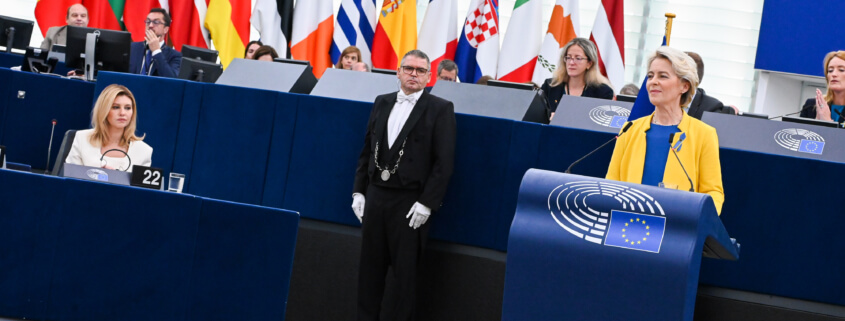State of the Union speech: steering Europe amid multiple crises
During the first plenary meeting after the summer break, President von der Leyen held the traditional State of the Union speech to describe the recent successes and upcoming initiatives of the European Commission. The war in Ukraine and its consequences on the global energy and commodities markets represented the focal point of her intervention.
President von der Leyen held today, 14 September 2022, her third State of the Union speech, before the MEPs and the wife of the President of Ukraine. In a year marked by the Russian aggression to Ukraine and the unfolding of the resulting economic consequences, and after a summer during which Europe experienced one of the worst droughts in its history, Europe has demonstrated reactivity, solidarity and unity, said von der Leyen, swiftly approving solidarity initiatives for Ukraine, imposing economic sanction against Russia and mobilizing common resources to help EU countries most hit by wildfires.
The war in Ukraine and its consequences on the global markets represented the focal point of her intervention. To counter inflation and support EU manufacturers, an initiative will be launched setting a cap on extra-revenues of companies producing electricity and redistributing the extra profits among EU citizens, while a EU hydrogen bank will be launched to facilitate the uptake of hydrogen on a large scale, as a part of the efforts to accelerate on green energy autonomy. In addition, measures to lower energy consumption and reforming the electricity market will be proposed, to reduce the overall negative effects of energy prices rise and contribute to the EU Green Deal priorities.
Other issues discussed include the defense of EU political and democratic values, both internally and from external threats ; the need for a stronger EU common action on ensuring the supply of critical raw materials (via a European Act) that are indispensable to ensure EU’s autonomy; the importance of making the EU a more attractive place for businesses, advancing in the accomplishment of the single market, simplifying the access to capital, the entry into our labour market of newcomers from abroad and contrasting skills’ mismatch. Finally, President von der Leyen took stock of the conclusions of the Conference on the Future of Europe, announcing the uptake of some of the suggestions raised in that context (for instance on mental health) and calling for convening a European convention to discuss the necessary Treaty reforms.
CEC has supported since the very beginning of the aggression against Ukraine the EU’s determination to counter Russia, and shares the different decisions taken by the EU and the international community against Putin’s regime. We welcome von der Leyen’s initiatives on energy prices and ensuring EU’s future industrial autonomy, especially in the field of rare materials, and we very much support the intention to make 2023 the Year of Skills. In this respect, CEC has put at the very center of its agenda the development of a new education paradigm for managers focused on sustainable leadership as a tool to make transition a reality. However, while we appreciate the reference to social market economy, it is regrettable that no mention has been made in the SOTEU to social Europe, in a moment when rising inflation and the risk of interrupting production because of unsustainable energy prices announce bad prospects for the European economy.

 European Commission, 2022
European Commission, 2022

